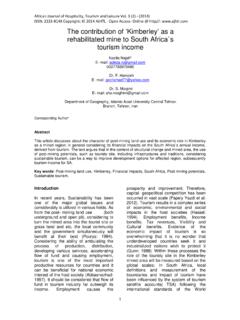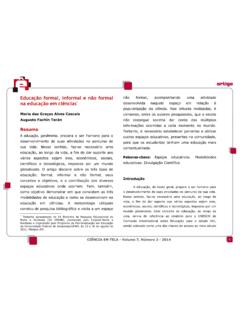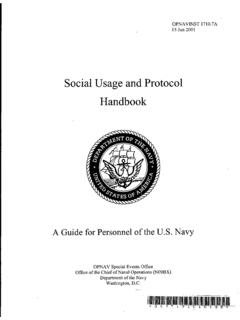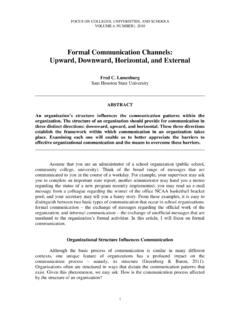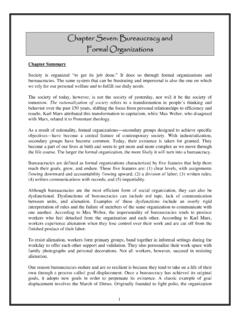Transcription of Impact Analysis of the COVID-19 Pandemic on the Informal ...
1 African Journal of Hospitality, Tourism and Leisure. ISSN: 2223-814X February 2021, Vol 10, No 1, pp. 165-178 165 AJHTL Open Access - Online @ Impact Analysis of the COVID-19 Pandemic on the Informal Sector Business Tourism Economy in Zimbabwe Logistic Makoni* School of Tourism and Hospitality, College of Business and Economics, University of Johannesburg, Johannesburg, South Africa, Email, Tembi M. Tichaawa School of Tourism and Hospitality, College of Business and Economics, University of Johannesburg, Johannesburg, South Africa, Email, *Corresponding Author How to cite this article: Makoni, L & Tichaawa, T.
2 M. (2021). Impact Analysis of the COVID-19 Pandemic on the Informal Sector Business Tourism Economy in Zimbabwe. African Journal of Hospitality, Tourism and Leisure, 10(1):165-178. DOI: Abstract This study sought to conduct a socio-economic Impact assessment of the COVID-19 Pandemic on Informal business tourism in Zimbabwe. The specific objective of this study was to identify the extent to which the Informal business tourism economy in Zimbabwe has been affected by the COVID-19 Pandemic and to prescribe guidelines and frameworks of workable actions to address the problems.
3 As such, the study adopted a desktop research approach in which a thematic Analysis of existing tourism development literature on business tourism in developing economies served as the basis for the arguments presented. Key issues highlighted in the paper include impacts on the supply of basic commodities and household income of the traders and business operations of the related businesses in the formal sector, traders survival strategies during the course of the national lockdown, and implications on the way forward. Furthermore, the study offers conclusions and implications drawn from the themes formulated from these key issues.
4 The study also provides insights on the vulnerability of the Informal business tourism sector to unforeseen occurrences, and how the affected stakeholder can recover from such a blow. Keywords: Socio-economic Impact , COVID-19 , Coronavirus, Informal Business Tourism, Zimbabwe Introduction The Informal business economic sector in developing countries represents a strong economic multiplier effect (Tichaawa, 2017). Through its content and its role, the sector represents, in the context of contemporary civilization, a distinct area of economic activity and a segment of essential importance in the economic and social life of the majority of countries, especially in sub-Saharan Africa (Benjamin & Mbaye, 2014; Grant, 2015; Rogerson, 2005, 2018).
5 Benjamin and Mbaye (2014) advance that Informal business tourism is a vital aspect of the Informal economy across the region. Since the majority of people residing in urban areas work in the Informal sector, and the sector constitutes over 80% of employment (Grant, 2015), Rogerson (2018) contests that informality holds a great place of importance as a dimension of all economic sectors of the sub-Saharan African region, including the region s expanding tourism sector. Many studies (see Bandyopadbyay, 2020; Bhattacharjee & Sarkar, 2020; Dey, 2020; Dobler, 2016; Eldrede & Kadirov, 2020; Ghosh & Chaudbury, 2020; Jha & Pankay, 2020; Nshimbi, 2020; Palat, 2020; Peberdy, 2017; Peberdy, Crush, Tevera, Campbell, Zindela, African Journal of Hospitality, Tourism and Leisure, Volume X (X) - (2020) ISSN: 2223-814X Copyright: 2020 AJHTL /Author(s) | Open Access Online @ 166 Raimundo, Green, Chikanda & Tawodzera, 2015; Rogerson, 2018; Samaddar, 2020.)
6 Tiwari, 2020) suggest that informality constitutes a major portion of the developing countries socio-economy. A number of scholars contributing to such knowledge (Dobler, 2016; Masango & Haraldson, 2010; Peberdy, 2017; Peberdy et al., 2015; Tichaawa, 2017; United Nations Conference on Trade and Development [UNCTAD], 2019) argue that over 50% of the informality in developing countries can be seen through Informal business tourism which, according to Rogerson (2018), largely manifests in both domestic and international (cross-border) travel.
7 Unlike any other country in the African region, Zimbabwe boasts over 70% of Informal business tourism (International Monetary Fund, 2018) and this trend has continued to spiral since the beginning of the country s economic and political dilemmas in the early 2000s. Given the circumstance around the travelling nature of Informal business tourism (Eldrede & Kadirov, 2020; Nshimbi, 2018, 2020; Rogerson, 2005, 2006; Rogerson & Saarinen, 2018), and the ultimate reliance of the majority of the Zimbabwean population on the sector (Masiyiwa, 2020; Nyathi, 2020.)
8 Southern Africa Migration Programme Report, 2017), the unforeseen circumstance of the COVID-19 Pandemic , and the subsequent halt in any kind of tourism-related movement (United National World Tourism Organisation [UNWTO] 2020), becomes a key area for discussion. In light of the Pandemic , this study sought to conduct an Impact Analysis of COVID-19 on the Informal Business Economy in sub-Saharan Africa (SSA), focusing on Zimbabwe as the case study area. The focus of this study, therefore, is on the Informal business tourism sector, with the main objective being to analyse the extent of the socioeconomic impacts of the COVID-19 Pandemic on the sector.
9 In addition, the study sought to prescribe policy guidelines and frameworks of workable actions to address the Impact of the COVID-19 Pandemic on the sector in Zimbabwe and the sub-Saharan African region as a whole. Zimbabwe is a perfect case study for the subject under investigation given its background and the socio-economic circumstances that the country has undergone for over two decades prior to the outbreak of the Pandemic , coupled with the country s significant reliance on the Informal business tourism economic sector for its survival (International Monetary Fund [IMF], 2018, 2020).
10 Also, perhaps needless to say, given that the sector is largely characterised by travelling by both the traders and the buyers, the current global experience of the COVID-19 Pandemic brings about a greater threat to the socio-economic wellbeing of many Zimbabweans, which renders a critical need for Analysis and the prescribing of solutions in that regard. Literature review Informal business tourism: a conceptual framework Informal business tourism is considered travel within and/or between neighbouring countries conducted by vulnerable, small, unregistered traders (UNCTAD, 2019).




